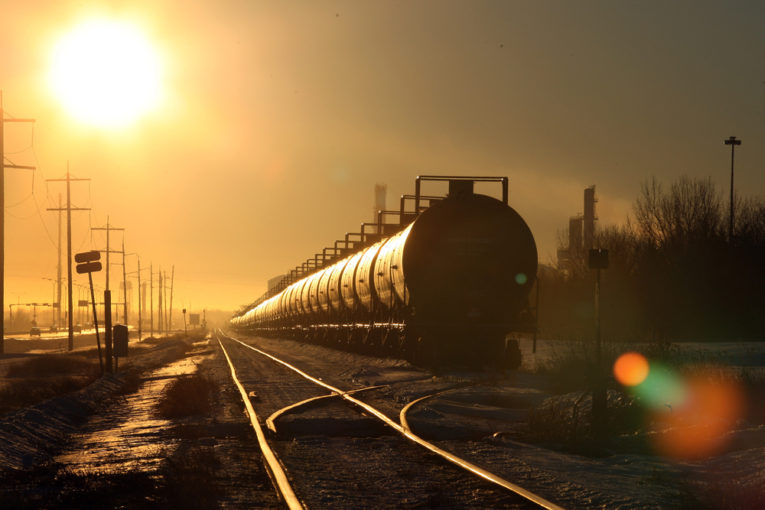
The trains are running late for Canada’s oil producers just when they need them the most.
After a two-week shutdown of one of the largest export pipelines to the U.S. caused oil to back up in Alberta tank farms, Canadian railroad companies struggling to fulfill commitments to ship other commodities aren’t able to help ease the oil glut.
“It’s hard for the railroads to change their operating plan really quickly,” Steve Owens, rail analyst at IHS Markit, said in a phone interview Wednesday. “There are equipment constraints and crew constraints.”
Canadian heavy oil prices sank this week to the cheapest level in four years versus U.S. benchmark West Texas Intermediate, leaving oil shippers racing to clear the glut in Alberta. Rail companies, who would be in line to see a big jump in oil business, are busy instead trying to catch up on delayed grain shipments and can’t fit more crude trains at their terminals.
Canadian National Railway Co. is facing a backlog of grain-carrying hopper car orders, according to the Ag Transport Coalition. Three derailments in the past two months have left the rail company playing “catch up” to fulfill orders, Kate Fenske, a spokeswoman, said by phone Monday.
Canadian crude tumbled after TransCanada Corp.’s Keystone pipeline went down just as new oilsands production from projects such as Suncor Energy Inc.’s Fort Hills mine were filling up pipelines once again. For December, Enbridge Inc., which operates the other main conduit from Alberta to the U.S., rationed the most space on its heavy oil lines since May and then further rationed shipments this month.
Five years ago, rail emerged as a relief valve for Canadian crude as oilsands production surged, filling pipelines, when oil topped US$100 a barrel. But after prices collapsed in 2014, output growth slowed and new pipeline capacity came online, reducing the need to ship crude by rail. Train shipments plunged below 100,000 barrels a day in April 2015 from a record 178,000 the previous September, National Energy Board data show.
Amid reduced volumes and with three new export pipelines approved by the Canadian and U.S. governments, rail carriers haven’t been as focused on crude as other commodities. Canadian National isn’t proactively seeking crude oil customers, Fenske said, adding that crude accounts for 1 per cent of the overall business.
‘Growth Pause’
“For crude, and it is by choice, we will take a bit of a growth pause,” Jean-Jacques Ruest, Canadian National’s chief marketing officer, said on the company’s third-quarter investor conference call in October. “We get the sense that customers still have capacity in the pipeline. Otherwise they’d be maybe behaving differently. They would be more willing to make commitments.”
Jeremy Berry, spokesman for Canadian Pacific Railway Ltd., the other Canadian rail company, didn’t immediately comment when contacted by email.
To be sure, crude-by-rail has been picking up. Loadings at three large terminals monitored by Genscape Inc. rose to 110,000 barrels a day the week ended Nov. 24, the highest since mid-March, David Arno, an Genscape oil analyst, said Dec. 11. Plains All American Pipeline LP and Irving Oil Ltd. are offering Canadian crude to U.S. buyers by rail for January and February loading, according to people familiar with the matter.
Renewed interest in railing heavy Canadian oil to refiners in the U.S. began about two weeks ago when Western Canadian Select crude prices fell to a US$20-a-barrel discount to WTI, according to people familiar with the situation.
Grain Competition
Buyers that had jumped in at that point took up available rail capacity. Now, there’s no more capacity up for grabs as buyers are competing for space with crop and grain shipments, the people said.
Canadian crude is selling at such a big discount that it’s economic to ship it on manifest trains, where tanker cars of crude are linked to existing trains carrying other commodities, Kevin Birn, a director at IHS Energy in Calgary, said by phone. Shipping by manifest train used to cost as much as US$24 a barrel, he said.
The recent disruptions to service, including one that shut the company’s main line between Edmonton and Saskatoon, Saskatchewan, for four days, have hindered grain shipments. The number of rail-car orders that Canadian National hasn’t filled is growing and “we’re beginning to recognize early-warning signs of a possible deterioration of service on the horizon,” said Wade Sobkowich, executive director of the Winnipeg-based Western Grain Elevator Association.
Canadian National supplied 57 per cent of grain-carrying hopper cars ordered by shippers in the week ended Dec. 2, Ag Transport Coalition data show. The backlog of orders totalled 2,247, compared with 356 unfilled orders during the same week a year earlier.
‘Top Priority’
Canadian National regards getting the country’s grain crop to market a “top priority” and is hiring new crews and bringing more locomotives online, Fenske said.
Meanwhile, Canadian oil producers are struggling. With heavy crude trading at a more than US$25-a-barrel discount to futures, oil producers are losing more than US$20 million a day compared with shipping by pipeline, IHS’s Birn said.
Bloomberg.com
You can read more of the news on source
